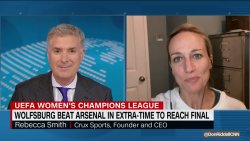Story highlights
FIFA ousts Cornel Borbely and Hans-Joachim Eckert
Pair say decision is "politically motivated'
One of the men who played a leading role in bringing down former FIFA president Sepp Blatter says reform of world football’s governing body is “dead.”
Hans-Joachim Eckert, the ethics judge of FIFA’s adjudicatory chamber, told CNN that the decision to remove him and investigator Cornel Borbely from their roles was a “political decision.”
FIFA has recommended that neither man should be re-elected when the organization’s congress takes place in Bahrain Thursday.
Both men played an integral role in the banning of Blatter, who resigned from his position in October 2015 after 17 years in charge in the midst of corruption allegations.
“In my opinion the reform process is – well it’s a strong word – but it’s dead,” Eckert told CNN Sport’s Christina Macfarlane.
“The independence of ethics is very, very, very important for FIFA for the view outside, for the people who are playing football and even for the media.
“All these people are looking to FIFA. What are they doing? Is there coming a new FIFA? Or is the old FIFA coming back again?”
Pressed on why the decision had been made to bring his tenure to an end, Eckert said: “This is a very, very good question and I think the right man would be the President [Gianni Infantino] or the people of the council to ask them why they did the decision like that.
“We definitely don’t know. I’m sorry I can’t tell you anymore”.
According to a statement issued by the ethics committee, the investigatory chamber has carried out 194 investigations since 2015 while the adjudicatory wing has sentenced more than 70 officials during the same time frame.
But FIFA has moved to recommend that the two men be replaced – a decision which the pair say will “lead to a renewed loss of trust and further hurt the already tarnished image of FIFA.”

Football’s world governing body did not immediately respond to CNN’s questions as to why FIFA had decided to replace Borbely and Eckert, especially as dozens of investigations are still under way.
Borbely and Eckert issued a statement Tuesday saying FIFA’s decision was “clearly politically motivated” and “puts de facto an end to the reform efforts.”
The statement added: “Consequently, the non-reappointment will have a negative impact on FIFA in the medium and long term.”
FIFA is recommending that Borbely be replaced by Colombian prosecutor Maria Claudia Rojas, while Greek judge Vassilios Skouris, a former head of the European Court of Justice, is set to take over from Eckert.
READ: FIFA ‘striving’ to rebuild ‘tarnished image,’ but fans unconvinced
Blatter
The move appears to have come as a surprise and at at a time, according to Borbely, where the ethics committee is still looking into “several hundred” cases of possible corruption.
“We worked well on a very high level with a huge volume of cases,” Borbely told a news conference Wednesday.
“There was no need to change the ethics committee – the only conclusion can be that this was politically intended.”
Eckert has been in charge of the adjudicatory chamber since 2012, while Borbely was appointed in 2014.
INTERACTIVE: Build your Ultimate Football Player
The two men have presided over some of the biggest cases in FIFA’s history, banning Blatter, and Michel Platini, the former head of Europe’s governing body, UEFA.
Both Blatter and Platini were originally banned for eight years each in December 2015, with FIFA reducing both men’s punishment to six years, upon appeal. Platini’s ban was then further reduced to four years by the Court of Arbitration for Sport.
Visit cnn.com/football for more news and videos
The original verdict was handed out after the Ethics Committee found that Platini had received a two-million Swiss franc ($2.02 million) “advisory payment” from Blatter.
Current FIFA president Gianni Infantino was himself investigated by the ethics committee last year but was cleared after an investigation into his expenses.
CNN’s Aleks Klosok in London contributed to this report




















